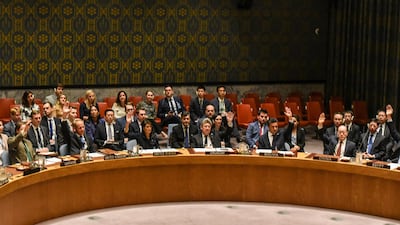The United Nations is no stranger to political challenges or attempts at reform. And this week, at the 72nd Session of the UN General Assembly, there will be a dose of both. The international organisation is facing continued difficulties in imposing international law, with repeated violations of its Security Council resolutions from countries like North Korea and Israel. Accountability is in short supply. Weeks after a UN body officially announced Syria's government used chemical weapons against its own people, the Al Assad regime will be able to attend the international meeting and claim "victory" over extremists. Challenges, financial and political, from the new US administration, in addition to unresolved crises in Yemen, Libya, Myanmar and beyond continue.
And yet, the UN recognises these failings, especially with Antonio Guterres, its new secretary general, making reform one of his primary goals. Unlike previous years, reform is not a side note. Rather, it is centre stage.
The Monday before the kick off of the general debate has always been a key moment to focus world leaders on the most pressing issue perceived by the UN. This year that moment is dedicated to a high level meeting on UN reform. Issues such as strengthening the UN secretariat, revitalising the General Assembly and expanding the Security Council will be looked at, in addition to reminding members that the UN is ultimately the result of what its membership allows it to be.
This year’s General Assembly is titled "focusing on people – striving for peace and a decent life for all on a sustainable planet". The sustainable development goals, agreed two years ago as a target for a better life for all, are meant to be the vehicle to deliver on this promise. However, without a mechanism to hold those who fail their people or foster conflict it is impossible to envision success.
_____________________
Read more from Opinion on the United Nations
Editorial: In praise of the UN's imprecise goals
The fate of humanity rests in the hands of each and every one of us
Editorial: Despite faults, the UN remains indispensable
_____________________
The United Nations was born at the end of the Second World War, as the United States emerged as the leading global power. As such, it is only natural that Washington DC has much influence on the UN. In addition to being the largest sole contributor to the UN’s budget.
This year's meeting will be one of many firsts. The first for Mr Guterres but also a first for Donald Trump, the US president. The Trump administration has made it clear that it wants to limit the role of the UN in various areas. It has adopted an official policy to reduce American funding to the UN across the board, from peacekeeping missions to the United Nations Population Fund, in addition to a number of policies to signal disengagement, including reducing the level of participation in the General Assembly.
Mr Trump has highlighted three pillars of his policy towards the UN. In previewing Mr Trump's participation in the General Assembly, H R McMaster, US national security adviser, explained that the American administration believes in the role of the United Nations to promote peace and stability around the world, but that role would require UN reform and protecting the rights of individual states. He explained that "the president's consistent message across all of his engagements throughout the week will emphasise three goals common to all nations who will be gathered there: first, to promote peace. Second, to promote prosperity. And third, to uphold sovereignty and accountability". In what concerns peace and prosperity, this is the stated goal of the UN and its member states. However, issues of sovereignty and accountability are often what lead to controversy. And while Mr Trump has been very critical of the UN, the White House has confirmed that the meeting on reform will be a chance to improve its state.
_____________________
Read more on the UN General Assembly
Global hunger on the rise for first time in decade, UN says
_____________________
The tension between sovereignty and accountability is not new. While nation states in our modern era rest on sovereign rights, the whole principle of accountability and adhering to international law requires strengthening the United Nations and diversifying its ability to impose law. It is under the guise of sovereignty that Myanmar’s leaders can encourage the burning entire villages to the ground and displacement of hundreds of thousands. In a statement last week, Mr Guterres said "the government of Myanmar until now has been completely deaf to our requests". And so the challenge to the UN, and its member states, is how to have the right mechanism to act quickly when the stakes are so high as to displace hundreds of thousands of civilians over a matter of a few days?
Over the last three years, ISIL was deemed the ultimate challenge to sovereignty and international accountability. Rejecting internationally recognised borders, publicly killing civilians and threatening the international order, ISIL was the epitome of what happens with failed governance.
An international coalition has been able to push ISIL back in Syria and Iraq. And yet at this year's General Assembly, there won't be celebrations of stability or peace after ISIL. The UN meetings are set to begin just days after the latest round of Astana talks that are determining the fate of Syria without Syrian presence. Sovereignty at its very weakest. And as UN week unfolds, Iraq faces the unknown outcome of a unilateral decision by the Kurdistan Regional Government to hold a referendum that calls for the dismemberment of one of the founding members of the United Nations. How the UN deals with these challenges will be the ultimate test of whether high level meetings on reform hold any value.
Follow The National's Opinion section on Twitter


